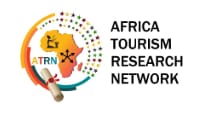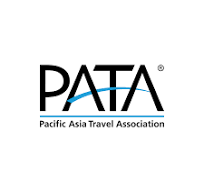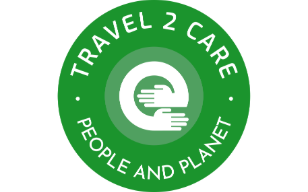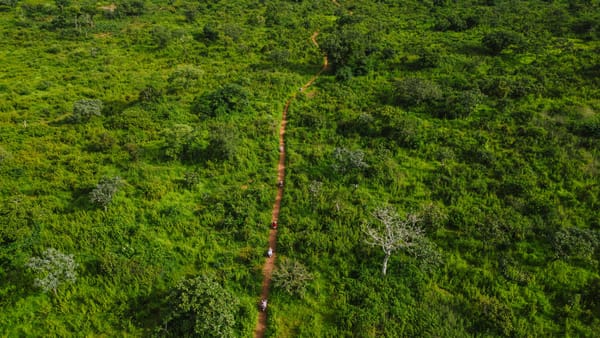Meaningful Tourism – Being a part of the solution instead a part of the problem
Meaningful Tourism Weekly Editorial
Dear reader,
First of all, a big Thank You! for all the positive feedback and the encouragement your humble editor and the Meaningful Tourism Weekly team and authors received. The first issue found already a lot of readers and subscribers. We are continuing to work on the design as well as the content and are welcoming any suggestions for both.
In these turbulent times, when the post-Cold War and post-Pandemic world suddenly becomes a post-Free trade world, not only international tourism is endangered. It seems also that the most burning (excuse the pun!) problem of mankind, the climate catastrophe, is put onto a backseat. Even major insurance companies are warning that the world is fast approaching temperature levels where insurers will no longer be able to offer cover for many climate risks, according to a recent interview in The Guardian with Günther Thallinger, board member of Allianz SE, one of the world’s biggest insurance companies. The damage at +3 degrees Celsius will be so great that governments will be unable to provide financial bailouts and it will become impossible to adapt to the multitude of climate impacts. Still, the news are occupied by pointless economic warfare and increased spending on weapons.
Nevertheless, the demand for sustainable tourism is increasing as is the call for forms of tourism which are showing more respect for host communities and employees working in the tourism and hospitality industry. Last month Agoda published a survey that also Asian travellers are by now more sustainability-conscious than ever and are actively seeking eco-friendly accommodation and meaningful tourism experiences. To translate this into real action depends on a holistic approach to tourism. The WTTC earlier this year in a major survey still followed the binary idea of contrasting spending vs. sustainable behaviour, finding not surprisingly a gap between intention and action. The Meaningful Tourism approach can avoid this gap by providing objective benefits and subjective satisfaction to all stakeholders involved.
WTTC in its study rightly recommended the need to highlight the personal and economic benefit of sustainability and the need of companies and governments to align on sustainability goals, making sure that responsible choices are incentivised, not penalized.
One way to start bringing these different initiatives together in one holistic strategy for a company, organisation or destination are the Meaningful Tourism Transformational Game Workshop, which are offered by certified trainers in many countries of the world. In day participants learn in the form of a role play to understand the situation and positions of the different stakeholders, from small souvenir shop owners to hotel managers to NGOs and local farmers and citizens. The workshops also help to develop SMART KPIs, Key Perfomance Indicators which help to measure and to manage benefits and satisfaction for each of the stakeholders. In the Meaningful Tourism Weekly you will find regularly reports on such workshops and the sometimes surprising solutions found to align seemingly unsurmountable contradictions. Already now you can find every week a short portrait and interview with one of the certified trainers for the Meaningful Tourism Transformational Game Workshop.
Tourism used to be part of the solution, bringing jobs, smokestack-free economic development and opportunities for entrepreneurs, women and rural populations on the one hand and joy, entertainment, new experiences and even peace on the other hand. With climate change and cultural homogenization tourism today is seen as part of the problem, creating unnecessary pollution and taking away city centers, beaches and affordable apartments from the local population. Tourism taxes and limitation of entry Meaningful Tourism Transformational Game Workshop are not a solution, turning tourism into a luxury again and killing especially SMEs and job opportunities for women.
Almost everybody – at least outside the USA – is interested to minimize the ecological footprint of tourism and hospitality, to increase the economic benefits for local populations and to provide transformational experiences. However, with the endless number of certifications and labels and with still widespread greenwashing, there is a reluctance to endorse activities and to spend an extra coin. This newsletter, the workshops and more intensive forms of support of the implementation of a Meaningful Tourism strategy all have the aim to bring about a turnaround away from shame and accusations towards a positive attitude and development and indeed towards benefits and satisfaction for all stakeholders involved, namely travellers, hosts, employees, companies, governments and the environment.
If you enjoy reading the Meaningful Tourism Weekly, please share the news about this new source of information in your network. As already said above, any comments and feedback are also more than welcome.
All best wishes from your humble editor and the whole Meaningful Tourism Centre team!

Editor: Prof. Dr. Wolfgang Georg Arlt
Guest Article
Climate Change and Tourism: Challenges and Opportunities for Conscious Collaboration
By Gopinath Parayil
At the concluding session of Bridges for Conscious Travel, I had the opportunity to deliver a keynote that reflected on the urgent intersections of climate change and tourism. My intention was not just to highlight the challenges but to offer a glimpse into the possibilities of what the tourism sector can do when it aligns with resilience, regeneration, and community well-being.
Setting the Context
We live in a world increasingly shaped by climate extremes—floods, heatwaves, rising seas, and ecosystem collapses are not distant threats but daily realities in many parts of the world. Tourism, both vulnerable to and complicit in this crisis, must respond. But rather than positioning travel as a passive observer of change, what if we saw it as an active agent of resilience?
Hyperlocal Solutions with Global Relevance
At The Blue Yonder and our partners at the Resilient Destinations Foundation, we’ve been experimenting with hyperlocal initiatives that respond to climate change not just as a crisis but as a design challenge. Some of these initiatives were showcased during the keynote:
Nilavala – Twilight Dinner on a Chinese Fishing Net
More than a travel experience, this initiative is a response to the declining livelihoods of fishers due to changing coastal patterns and dwindling catch. The dinner creates a dignified, supplementary income stream while celebrating the heritage and ecology of the backwaters. Read more
Mangrove Trail
This is both a tourism product and an ecological project. We work with local communities to restore mangrove ecosystems, which act as natural buffers against coastal erosion. Simultaneously, we address the plastic waste crisis by upcycling PET bottles into road-making pellets, creating a circular economy model that links conservation, livelihoods, and education. Video
Chavittunatakam and the Rising Tide
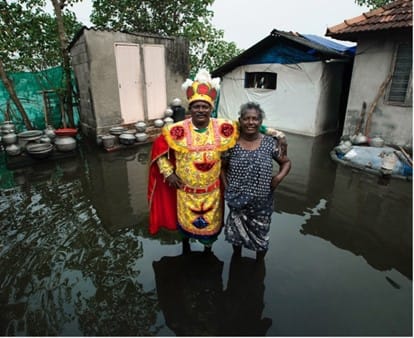
Chavittunatakam Artists' life captured by K.R. Sunil
This traditional art form, rooted in coastal Christian communities, is facing a new threat—tidal flooding. Artists now grapple not only with preserving their craft but also with protecting their living and performance spaces.
We support them by creating new platforms for performance and dialogue through tourism.
From Documentation to Action: Climate Portraits from the Brink
We screened a short documentary that follows the lives of seven families affected by climate change. These are not stories of despair alone. They are stories of innovation, of communities adapting in extraordinary ways. The travel industry has the ability—and responsibility—to amplify these narratives and support the solutions they create.
Pokkali – The Story of Rice
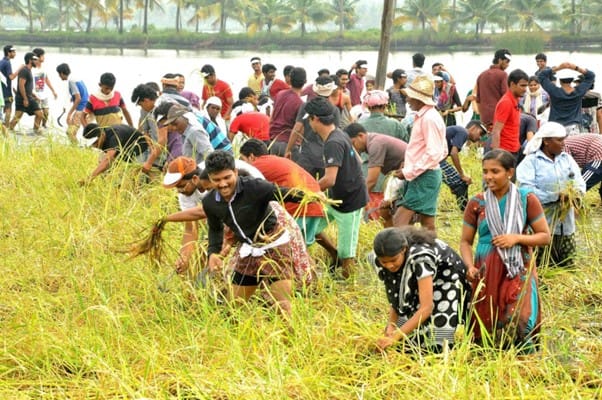
Student volunteers assisting farmers harvest Pokkali rice when they ran short of labour in 2012
One of the most climate-resilient rice farming systems in the world, Pokkali fields in Kerala act as carbon sinks three times more effective than tropical rainforests.
Through responsible travel initiatives, we bring travelers into these landscapes to understand, support, and learn from these traditional systems, which provide supplementary income for the community.
2018 Kerala Floods and the Story of Chekutty
I shared how the tourism sector came together during the 2018 floods. The Chekutty doll—born from water-damaged handloom fabric—became a symbol of resilience and dignity. This spirit of collaboration helped displaced weavers rebuild their lives and livelihoods, with the tourism industry playing a critical role.
Backwater Initiatives: Beyond the Postcard
We highlighted the Backwater History Tour and the revival of Arjuna Nritham, both efforts to connect travelers with living cultural heritage and the realities faced by artists and communities in the face of ecological disruption.
Resilient Kochi: A Living Lab
We presented Kochi as a live testbed for what a climate-resilient, climate-responsible destination could look like. This includes:
• Cochin International Airport, the world’s first 100% solar-powered airport
• Kochi Metro Rail, already running on over 55% renewable energy
• Kochi Water Metro, an all-electric public transport system connecting more than ten islands
• A growing network of over 170 electric autos as part of last-mile connectivity.
These create an integrated, low-carbon travel experience while building dignity and livelihood for local communities.
Collective Impact: Kuriyappilly Women’s Weavers Cooperative
I also shared how, just last month, the travel community helped raise over USD 20,000 in under four weeks to prevent a bank foreclosure for a women-led weaving cooperative in Chendamangalam. This collective action ensured they retained their land, their looms, and their livelihood. The next phase—business revitalization—is now underway in collaboration with tourism partners.
Looking Ahead: KAITHA and Global Collaboration
We introduced KAITHA, a platform for co-creating Climate-Resilient and Climate-Responsible Destinations. The idea is simple: how the USD 9 trillion tourism sector can actively partner with the USD 30 billion humanitarian sector to work on all phases of disaster management: mitigation, Preparation, Response, and Recovery. This has been explored further at the Humanitarian Leadership Conference in Doha, Qatar (April 8–9), hosted by the Centre for Humanitarian Leadership based in Melbourne, Australia.
A Thought to Close With
What if a collective of tourism businesses focused on reviving and regenerating one vulnerable destination every year—not through charity but as part of product development, business strategy, and shared return on investment?
This way, we build resilience not just for communities but for the tourism sector itself. In doing so, we also redefine what it means to travel—with responsibility, purpose, and solidarity.
Let us imagine. Let us co-create. Let us act.
To get in touch and check more on The Blue Yonder
Meet the Trainers for the Meaningful Tourism Transformative Game Workshop:
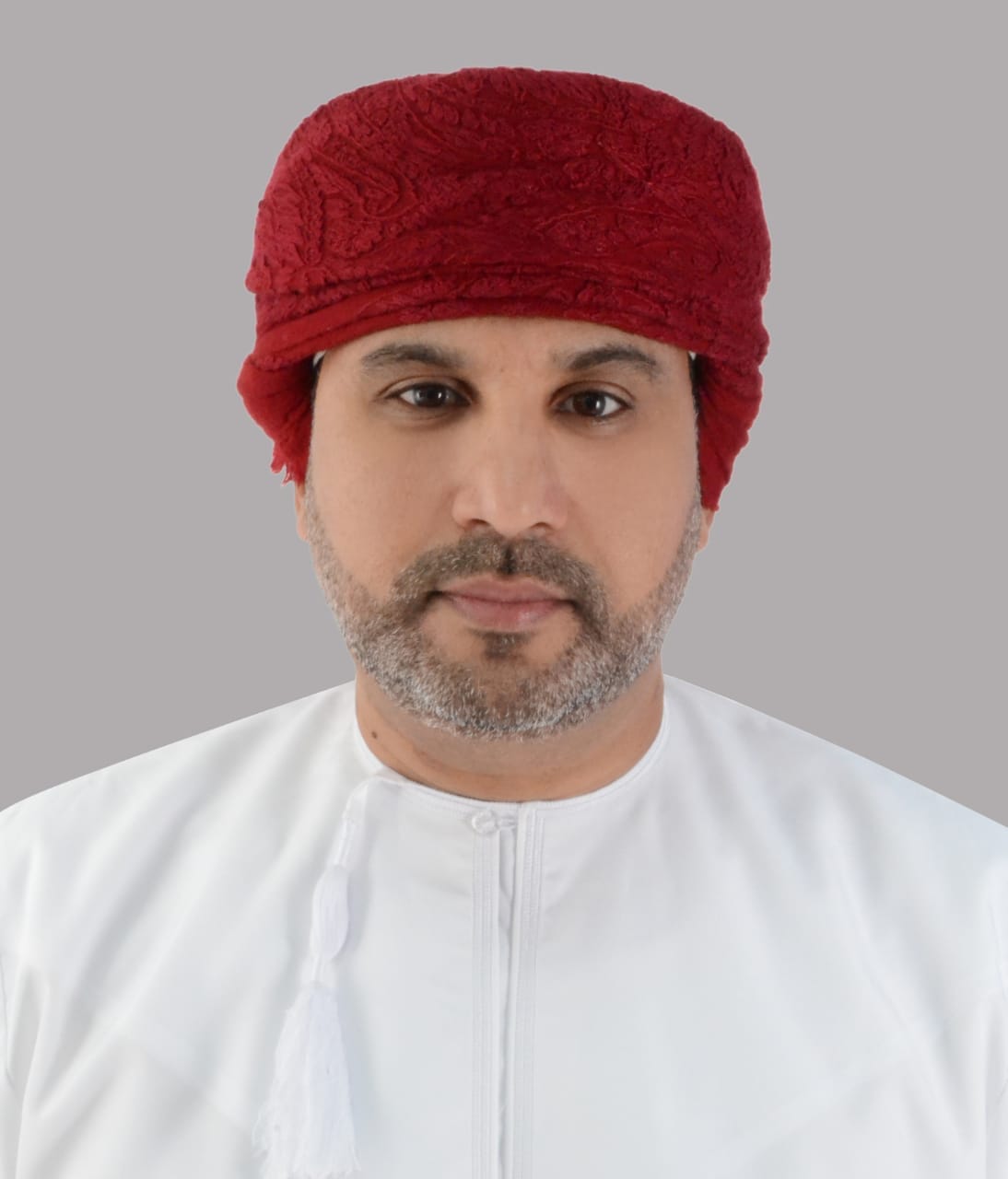
Ali Said Akaak, PhD - Oman
Born in Oman. PhD in Tourism Management & Development from the University of Exeter, United Kingdom. Master in Management, Oman. Over 20 years of experience in universities, tourism, and commerce. More than 10 years of experience as a Lecturer. He has published several research papers in Economics, Tourism, and Management. Currently, he is a Senior Lecturer of Business and Tourism Management at the University of Technology and Applied Science (UTAS) - Salalah, Oman.
Meaningful Tourism Weekly asked Ali about the situation of tourism in Oman and the role Meaningful Tourism paradigm can play to support the development in this country.
His answer:
Oman's tourism sector has transformed into one of the nation's most dynamic and strategic industries, playing a central role in economic diversification under Oman Vision 2040. From modest beginnings in the 1970s under His Majesty Sultan Qaboos bin Said, the sector has evolved significantly. International arrivals have surged from under 500,000 in the 1990s to 4 million in 2023, with 2024 projections reaching 5.3 million—reflecting steady investment in infrastructure, destination branding, and policy reform.
Recognized as a key pillar of Vision 2040, tourism is expected to contribute at least 3.5% to GDP by 2030, creating jobs, supporting SMEs, and promoting sustainability. Under His Majesty Sultan Haitham bin Tarik, the government has prioritized tourism in its national transformation agenda, driving reforms in governance, investment, digitalization, and community empowerment. The Ministry of Heritage and Tourism leads efforts in policy, branding, and sustainability, working closely with OMRAN Group on major projects like Madinat Al Irfan, Yiti Sustainable City, and heritage destinations in Salalah and Musandam. Over US$3 billion in investments are planned in the next five years.
The National Tourism Strategy 2040 aims to attract OMR 20 billion in investments, create 500,000 jobs, and develop 80,000 accommodation units. Oman's model emphasizes inclusivity, with each governorate developing tourism products based on local identity—from eco-tourism in Dhofar to desert experiences in Al Sharqiyah.
Tourism offerings are increasingly diverse, spanning culture, heritage, nature, adventure, wellness, cruises, and business events. Economic impact is rising, with tourism production reaching OMR 2 billion in 2023 and significant support for jobs and local enterprises.
Aligned with the Meaningful Tourism paradigm, Oman promotes authenticity, sustainability, and long-term value for all stakeholders, positioning itself as a global benchmark in responsible tourism development.
Trainers Around the World
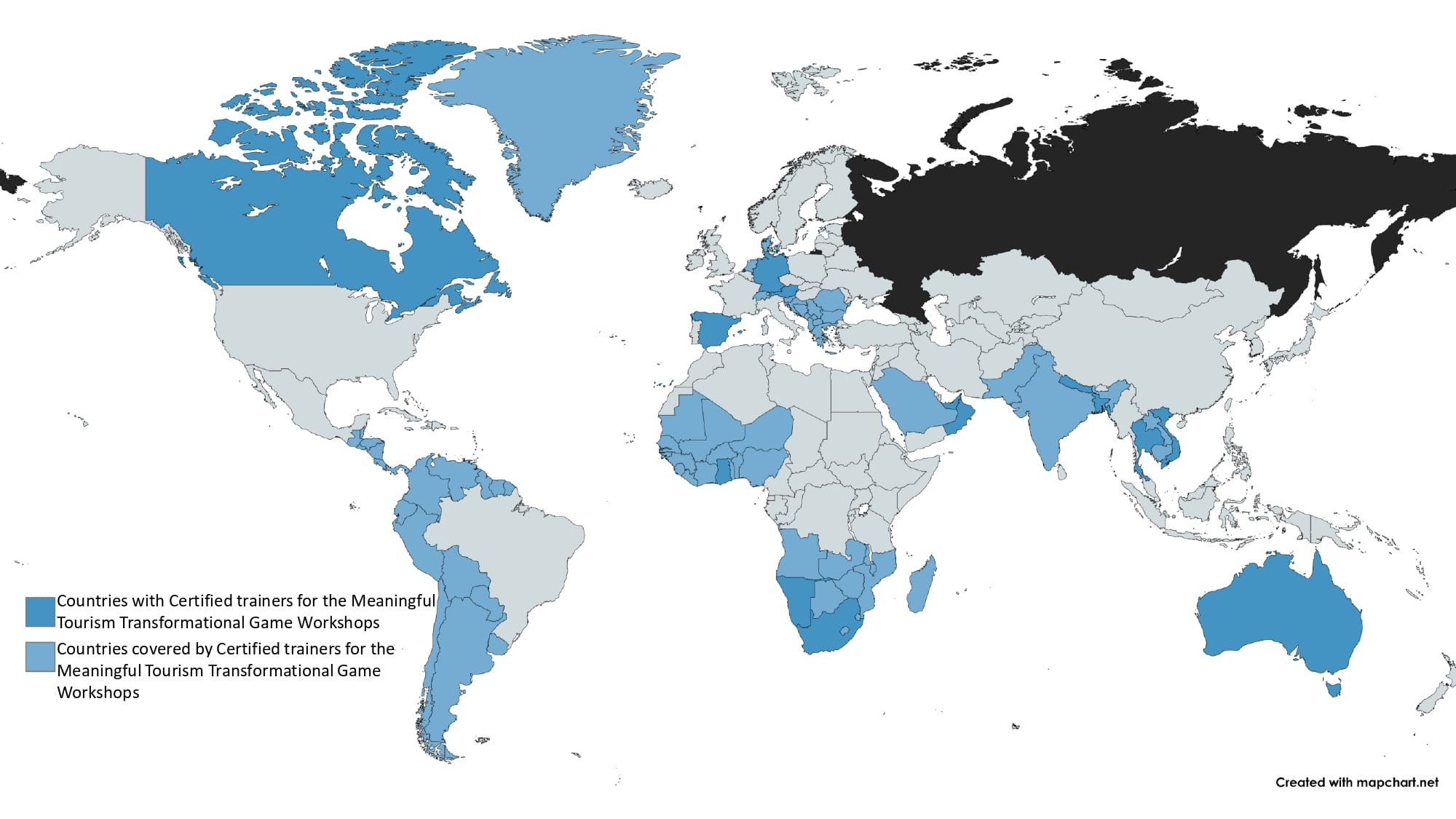
MTC is happy to invite more persons to become certified trainers and offering Meaningful Tourism Transformational Game Workshops in countries or regions not yet covered. If you have experience as a trainer and interest to support sustainable tourism, please contact us.
Meaningful Tourism Best Practice Example
Kilimanjaro Porters Assistance Project Ensuring Fair Treatment for Porters
Behind the Climb: A Hidden Struggle
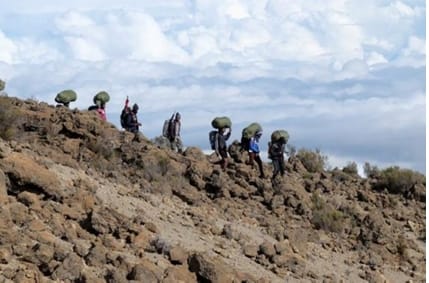
Porters supporting climbers at Mount Kilimanjaro
Mount Kilimanjaro draws thousands of trekkers every year, but the climb wouldn't be possible without porters. These dedicated workers carry supplies, set up camps, and support climbers—often while facing harsh conditions, low pay, and lack of proper equipment or food. For years, their contributions were undervalued, with few protections in place.
Driving Change Through Advocacy
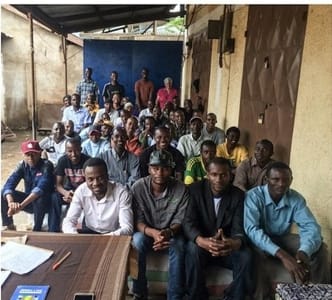
Kilimanjaro porters supported by KPAP initiative
The Kilimanjaro Porters Assistance Project (KPAP) was established to promote ethical treatment and fair working conditions for porters. Supported by the International Mountain Explorers Connection, a U.S.-based nonprofit promoting socially, economically, and environmentally responsible trekking, KPAP empowers mountain crews through advocacy, free gear lending, financial training, and education. Over 7,000 porters have already benefited from this initiative, which aims to uplift entire communities.
The Partner for Responsible Travel Program
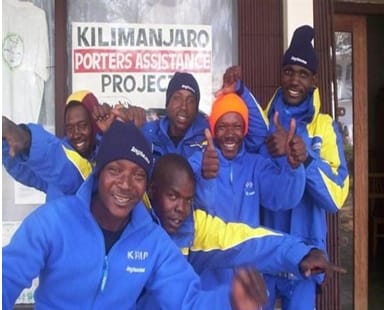
KPAP: Promoting fair and responsible trekking on Mount Kilimanjaro
KPAP’s Partner for Responsible Travel Program is a third-party system that verifies whether trekking companies meet fair labor standards. It ensures proper wages, tipping transparency, reasonable bag weights, adequate food, and safe accommodations. KPAP also runs training in English, first aid, budgeting, and “Leave No Trace” environmental stewardship. With 15 certified instructors now leading clean-up events and awareness sessions, the program is setting a global benchmark for responsible, sustainable tourism on Mount Kilimanjaro.
Meaningful Tourism News
For more information on the latest Meaningful Tourism news, we recommend looking at the following information from our partners and colleagues:
TRAVELLERS
Ethical tourism is on the rise – here’s where to go and how to help
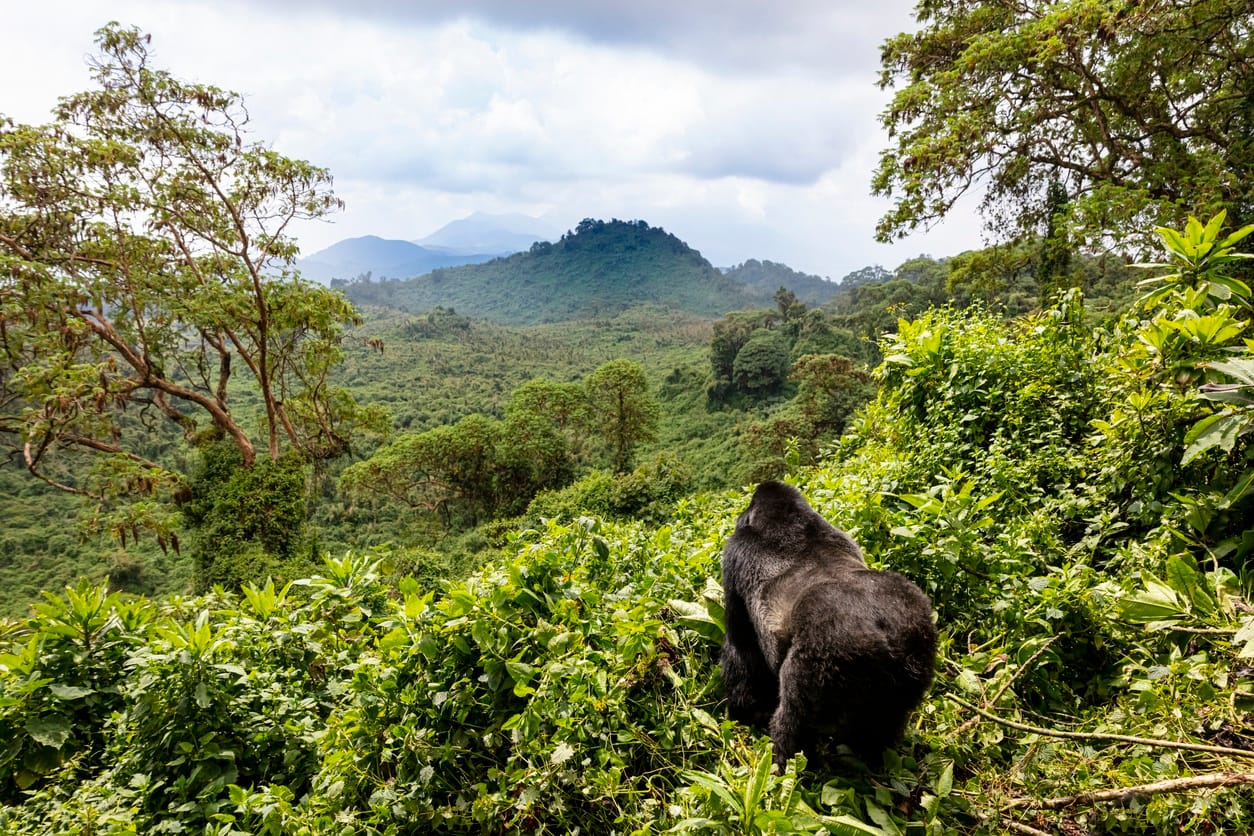
Tourists are increasingly looking to help conservation efforts. Photo: iStock - Dennis Stogsdill.
Africa is home to some of the world’s most incredible, and endangered, wildlife. Thousands of species face threats of extinction from loss of habitat, climate change, and poaching.
Go2Africa’s report reveals that conservation projects are gaining momentum as travellers request hands-on conservation activities, and lodges prioritise electric vehicles and solar power. Ethical tourism is becoming increasingly popular – Google searches have risen by 242 per cent in the last three months alone – and safari-goers in 2025 are seeking conservation-focused experiences and off-the-grid destinations.
Ethical tourism is on the rise – here’s where to go and how to help
HOST COMMUNITIES
These floating cottages in Basilan garner prestigious ASEAN Community-Based Tourism Award
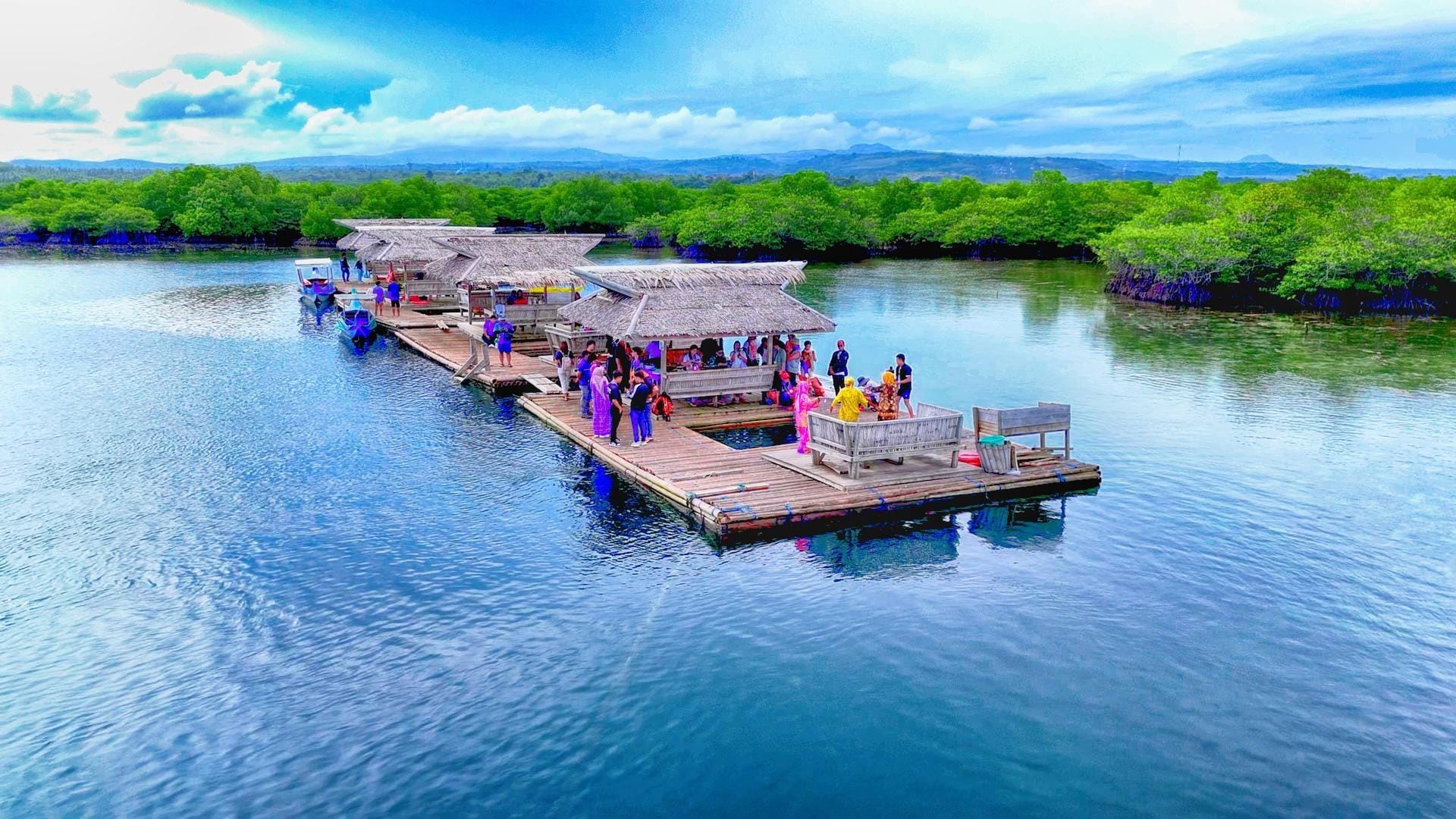
A unique tourism initiative has gained significant recognition in the charming de facto capital of the province of Basilan.
The floating cottages by the Marang-Marang Women's Association of Basilan have been honored with the ASEAN Community-Based Tourism Award for 2025, highlighting their innovative approach to sustainable tourism. This initiative uniquely blends local culture and gastronomy, promoting environmental conservation and community involvement.
These floating cottages in Basilan garner prestigious ASEAN Community-Based Tourism Award
EMPLOYEES
Walking to Work day for Employees by Travelife for Tour Operators

On the 4th of April, the Walk to Work Day was celebrated. Walking to work offers numerous benefits for both personal health and the environment. It’s an excellent way to improve your physical fitness, boost mental clarity, and contribute to a healthier planet. On Walk to Work Day, people are encouraged to embrace a slower start to their day by walking to their workplace, allowing them to enjoy these positive effects. The event, which was introduced by Prevention magazine in 2004, promotes reducing car usage, minimizing pollution, and lowering individual carbon footprints.
Travelife for Tour Operators – LinkedIn
COMPANIES
Corporate retreats in 2025 by Tenuta Di Paternostro Etruscan Country Retreat
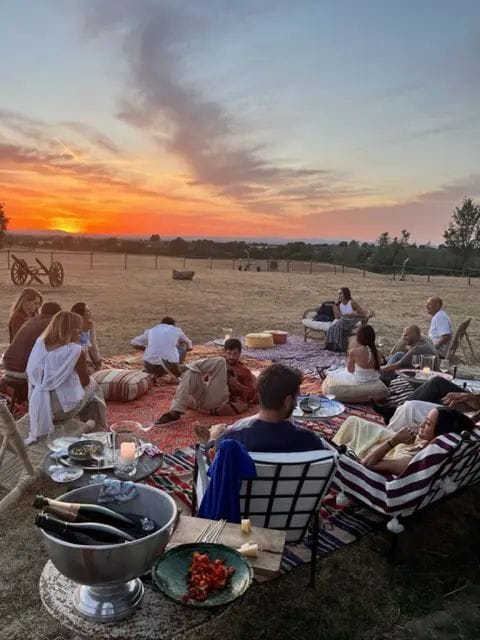
Corporate retreats in 2025 are no longer just about escaping the office—they’re strategic, inclusive, and thoughtfully designed, bespoke experiences. Here’s what’s shaping the way companies gather their teams this year:
1. Intentional, Goal-Oriented Retreats
Gone are the days of retreats that feel like mini-vacations with a side of team building. Now, companies are planning getaways with specific goals in mind—whether that’s recharging leadership, realigning after growth, or laying the groundwork for the next big move.
2. More Frequent, Smaller Gatherings
Instead of one massive annual retreat, businesses are spreading the love with shorter, more regular offsite meetups. This keeps the team connected year-round and allows for more focused conversations and agile planning.
Tenuta di Paternostro Etruscan Country Retreat on LinkedIn
Sustainability Materiality Map
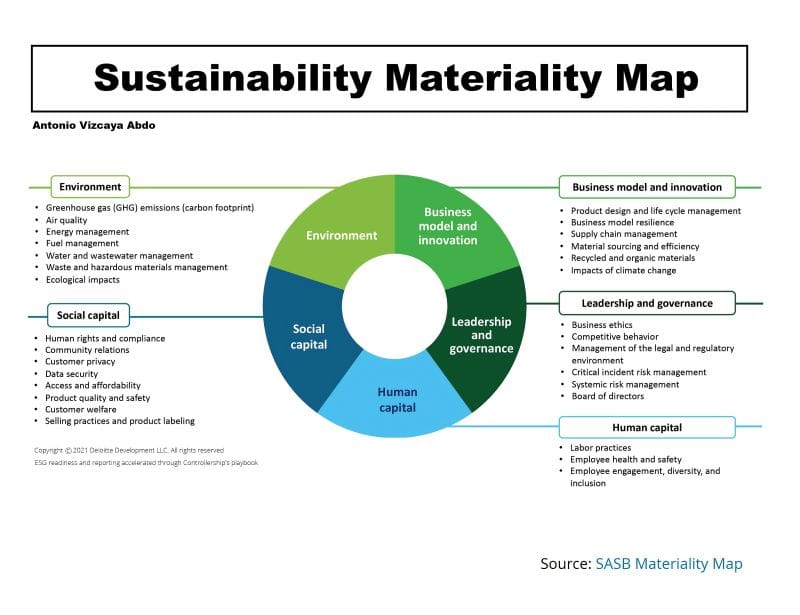
Robust materiality strategies must account for a wide range of sustainability topics across multiple dimensions. Limiting the scope to a narrow set of issues risks overlooking critical drivers of long-term business performance.
A comprehensive materiality approach considers environmental, social, and governance factors not in isolation, but as interconnected elements that influence risk exposure, value creation, and regulatory alignment.
LinkedIn Post by Antonio Vizcaya Abdo
GOVERNMENTS
GSTC Re-Brands the Global Sustainable Tourism Standards
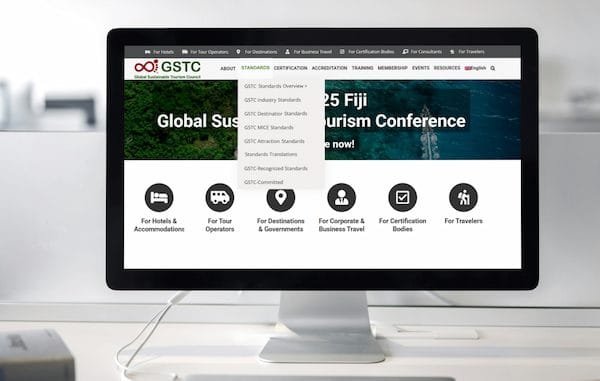
GSTC renames its global standards from ‘GSTC Criteria’ to ‘GSTC Standards’ to enhance clarity and alignment with international terminology.
GSTC Rebrands the Global Sustainable Tourism Standards
Tourismusstrategie Schleswig - Holstein 2030
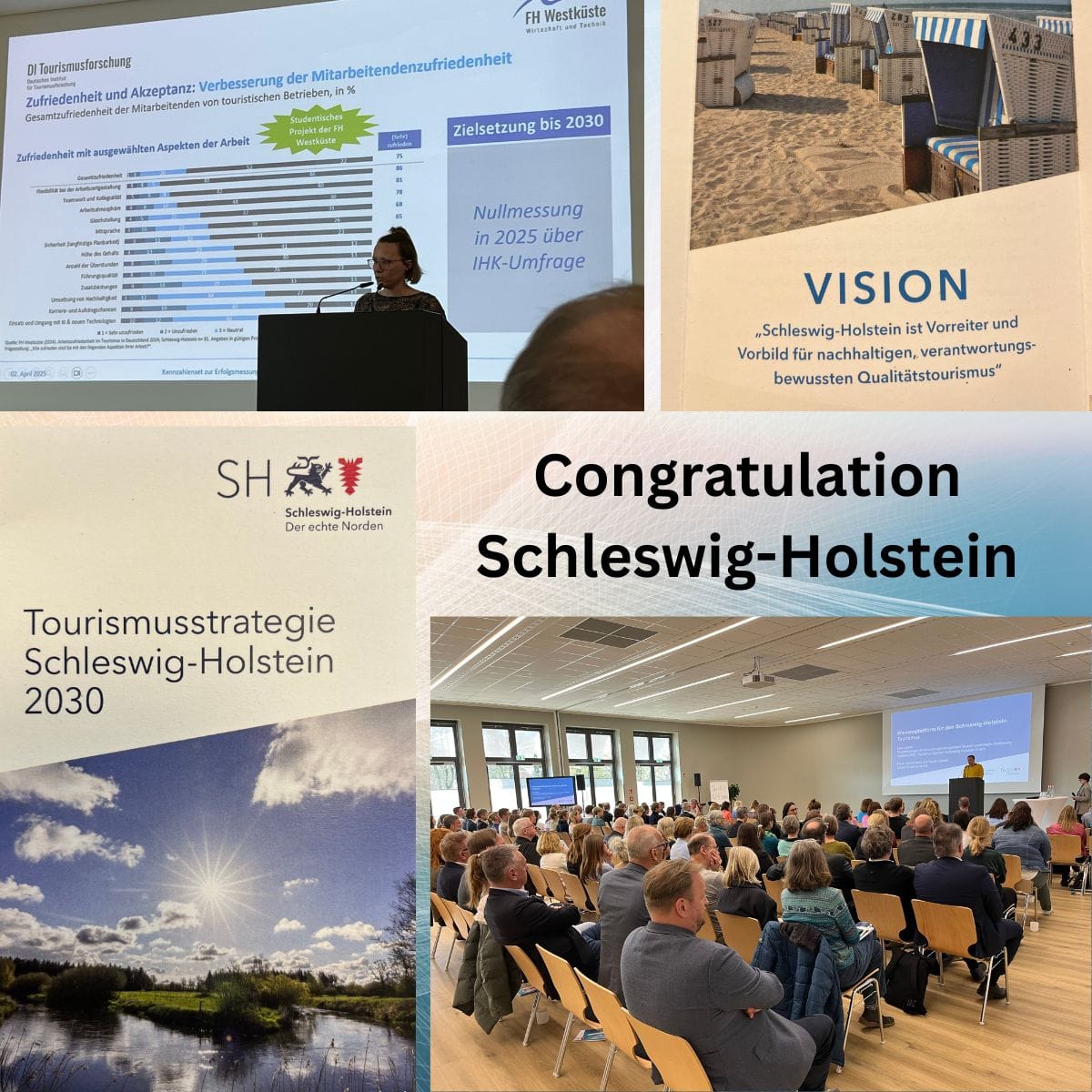
The northernmost federal state of Germany is the first state in Germany to include employee satisfaction in their 9 KPIs to evaluate the progress of the tourism strategy 2030. As this strategy includes inspiring KPIs measuring:
👉 The relevance of sustainability in the tourists' decision-making
👉 The number of organizations/destinations with sustainable labels
👉 The seasonality
👉 The acceptance of local inhabitants towards tourism
ENVIRONMENT
This Island Nation Is More Popular Than Ever—and Now Travelers Can Give Back Through Tourism
Fiji just launched a country-wide initiative to directly involve tourists in sustainability projects.
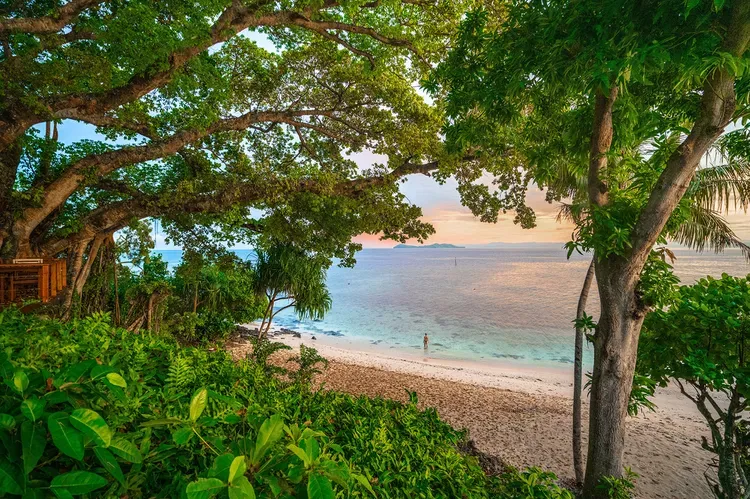
A guest of the Royal Davui Island Resort, Fiji walking on the beach at sunset. Photo: Courtesy of Royal Davui Resort
For anyone who has ever traveled far and wanted to give back in a direct and meaningful way, Fiji might just have the answer. The island nation just unveiled a country-wide sustainability initiative—Loloma Hour—to encourage all visitors to donate one hour of their trip to engage in projects ranging from reef preservation to sustaining local communities, all from the comfort of their vacation.
Fiji Tourism’s Sustainability Initiative: Loloma Hour
EVENTS
Colors of the World Expo and Conference

The first tourism fair and conferences for Event locations, held in Istanbul from April 18 - 20, 2025. Countries and cities, coming from diverse geographies, will showcase the most valuable symbols of their cultures to tourism professionals, business people, leading figures in the industry, and individual travelers arriving from all over the world with live cooking, performances, and shows.
On all three days, a conference with international experts will discuss the current and future event tourism development under the motto Meaningful Event Tourism: Destinations providing events as Transformational Experiences. The Meaningful Tourism Centre will be the organizer of the conference.
Colors of the World Official Website
Shaping the Future of Tourism: Insights & Strategies (Public Open Lecture)
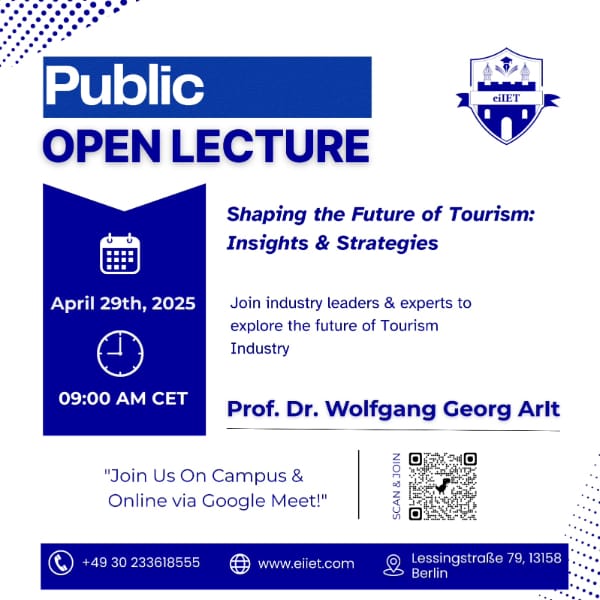
Public lecture in Berlin on April 29, presenting Meaningful Tourism and the Future of Tourism at the EIIET.
GITF Guangzhou International Travel Fair 2025
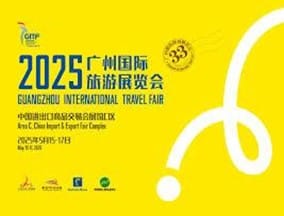
The GITF Guangzhou International Travel Fair 2025 will take place from May 15-17, 2025, in Guangzhou/China.
GITF is the travel fair and conference with the longest tradition in China and the main meeting point for the biggest international tourism source market in the world: South China, including the Greater Bay Area Hong Kong SAR and Macau SAR.
In 2025, the motto of the fair and the accompanying conference is Meaningful Tourism – Enduring Connections. The conference is organized by the Meaningful Tourism Centre. On the first day four keynote speakers from international organisations plus a presentation of the Greater Bay Area Inbound and Outbound Tourism Report done MTC in cooperation with Hong Kong Polytechnical University, Sun Yat-sen University Guangzhou and Macau University of Science and Technology will provide concentrated updates and insights. On the following two days several shorter focus satellite events will focus on several hot topics in Chinas outbound tourism including Meaningful Tourism in China.
The 19th UN Tourism Asia-Pacific Executive Training Programme on Tourism Policy and Strategy
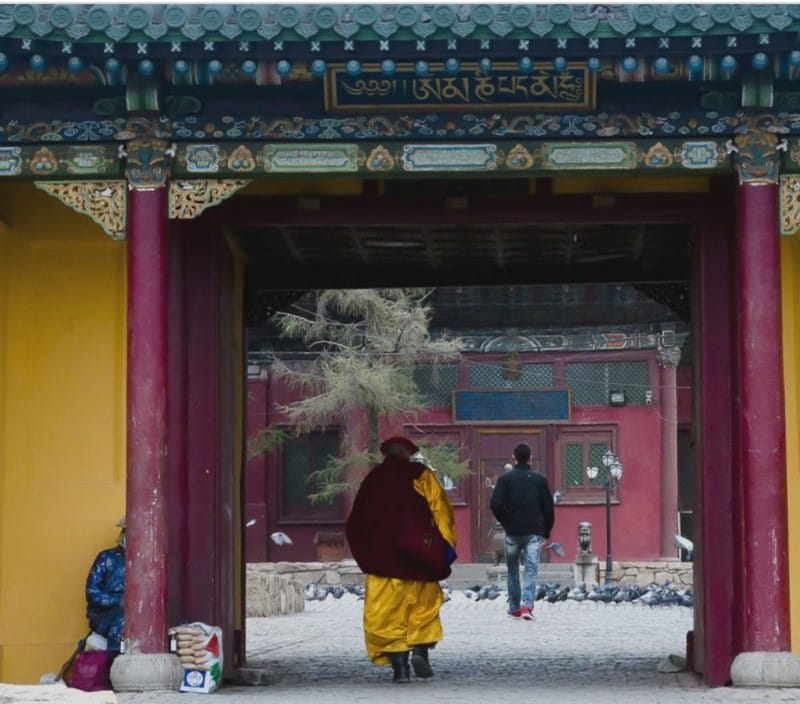
The 19th UN Tourism Asia-Pacific Executive Training Programme on Tourism Policy and Strategy organized by UN Tourism will be held in Ulaanbaatar, Mongolia from 19 – 22 May 2025.
Learn more on the official UN Tourism website →
Meaningful Tourism Weekly is published every Thursday by the MTC Meaningful Tourism Centre (London and Kathmandu).
Each Meaningful Tourism Weekly includes the Meaningful Tourism Weekly Editorial, news about MTC activities, a Best Practice example, a portrait of a MTC-certified trainer, news about upcoming events and occasionally additional op-ed pieces provided by guest authors.
Furthermore, carefully selected news items including videos and podcasts with a link to the original source are added, sorted according to the six main stakeholders of tourism and hospitality, as defined by the Meaningful Tourism paradigm: Traveller/Guests, Host community, employees in tourism and hospitality service providers, service providing companies, governments and the environment.
Subscription to Meaningful Tourism Weekly is free, there are no advertisements. Names and other details of the subscribers are not shared with anybody.
Sponsorship options are available.
If you are interested in the work of the Meaningful Tourism Centre, providing trainings, market research, product adaptation, consulting services, conferences, strategy development and marketing, visit our website www.meaningfultourismcentre.org or contact us using info@meaningfultourismcentre.org.
© 2025 Meaningful Tourism Centre Ltd. (London & Kathmandu). Texts and information can be used in other online and offline publications if the source “Meaningful Tourism Weekly” is mentioned.
PARTNERS

